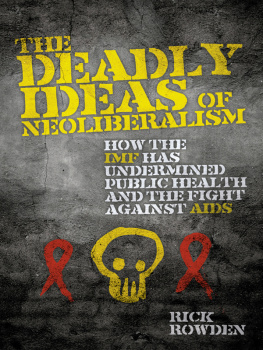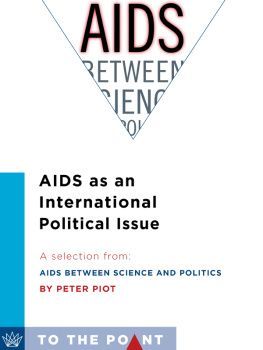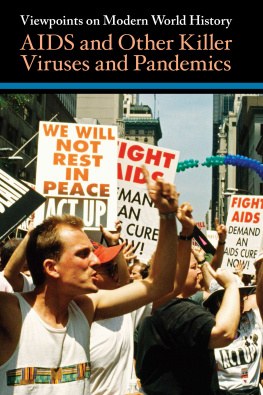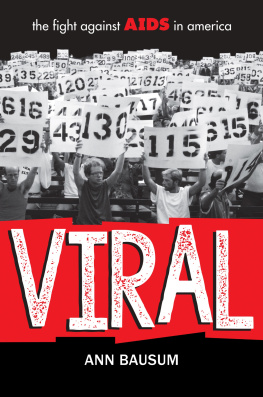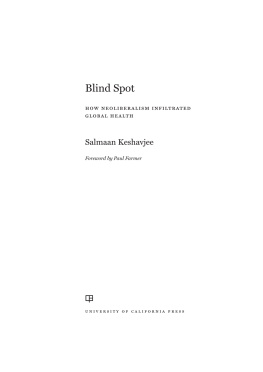
MORE PRAISE FOR THE DEADLY IDEAS OF NEOLIBERALISM
This book is a timely wake-up call that we must redouble our efforts to develop viable progressive economic alternatives to neoliberalism. Terry McKinley, Centre for Development Policy and Research, SOAS
The Deadly Ideas of Neoliberalism provides a powerful, compelling analysis of the little-known impact of international financial institutions on countless people suffering without access to health services around the world. Rowdens passionate interrogation of the controversial macroeconomic policies embraced by the IMF is compelling and accessible, set against the high-stakes struggle for access to HIV treatment in developing countries. Asia Russell, Director of International Policy, Health GAP
ABOUT THE AUTHOR
Rick Rowden worked in Washington, DC for nine years with advocacy NGOs engaged on foreign aid and development issues, including as senior policy analyst for the US office of ActionAid. He has travelled extensively and worked with policy-makers, economists and advocacy NGOs across Africa, Asia, Latin America and Europe to critically analyse the macroeconomic policies of the International Monetary Fund (IMF) and their impact on health spending in developing countries. With an MA and BA in international relations from San Francisco State University, he is an expert in NorthSouth relations and how the global foreign aid, trade and finance systems impact economic development. Previously, he taught global studies at California State University, Monterey Bay and political science at Golden Gate University in San Francisco. He is currently an inter-regional adviser with the Globalization and Development Strategies Division of the United Nations Conference on Trade and Development (UNCTAD) in Geneva, Switzerland.
THE DEADLY IDEAS OF NEOLIBERALISM
How the IMF has undermined public health and the fight against AIDS
Rick Rowden

Zed Books
LONDON | NEW YORK
The deadly ideas of neoliberalism: How the IMF has undermined public health and the fight against AIDS was first published in 2009 by Zed Books Ltd, 7 Cynthia Street, London N 1 9 JF , UK and Room 400, 175 Fifth Avenue, New York, NY 10010, USA
This ebook edition was first published in 2013
www.zedbooks.co.uk
Copyright Rick Rowden 2009
The right of Rick Rowden to be identified as the author of this work has been asserted by him in accordance with the Copyright, Designs and Patents Act, 1988
Set in Monotype Plantin and Gill Sans by Ewan Smith, London
Index:
Cover designed by Rogue Four Design
All rights reserved. No part of this publication may be reproduced, stored in a retrieval system or transmitted in any form or by any means, electronic, mechanical, photocopying or otherwise, without the prior permission of Zed Books Ltd.
A catalogue record for this book is available from the British Library
Library of Congress Cataloging in Publication Data available
ISBN 978 1 84813 641 0
ACKNOWLEDGEMENTS
I would like to offer a special word of thanks to my colleagues in the HIV/AIDS and public health activist community who gave me important insights and a deeper understanding of the issues addressed in this book, including Brook Baker, Eric Friedman, Gorik Ooms, Rob Yates, Aditi Sharma, Wendy Johnson and Paul Zeitz. Despite their helpful inputs, any errors or omissions are entirely my own. I also owe a debt of gratitude to my former colleagues at the development NGO ActionAid, including Atila Roque, Rose Wanjiru, Tennyson Williams, Thomas Johnny, Julie Juma, Collins Magalasi, Akanksha A. Marphatia, Amy Gray and David Archer, among many others, whose support in working on IMF issues was immense. A special thanks is due to Nancy Alexander and Jo Marie Griesgraber, whose patience and generosity were invaluable. I am particularly grateful for the assistance and guidance of several of todays most thoughtful and incisive economists with alternative perspectives, including Fernando Cardim de Carvalho, Ilene Grabel, Gerald Epstein, James Heintz, Pamela Sparr, Elissa Braunstein, Thomas Palley, Mark Weisbrot and Terry McKinley, among others. I have also taken great inspiration from the tireless efforts and unrelenting determination of my colleagues in the IMF Working Group in Washington, DC.
This book is dedicated to HIV/AIDS activists and public health advocates everywhere, who lobby the corridors of power and take to the streets to demand more
INTRODUCTION
This book tells the story of two remarkable phenomena that have unfolded over the last thirty years which are today heading towards a profound clash. One is the story of the success of health activists who forged global connections and gained the political clout to demand and get historic levels of public financing to treat a global health pandemic; the other is of the rise from obscurity to dominance of a set of economic ideas that have come to reshape the world we know today. During the 1980s, the world first took notice of a new virus and disease that attacked the human immune system and would come to be known as HIV/AIDS; the decade also witnessed a radical rethinking of the ways in which government plays a role in national economies with the introduction of free market and free trade reforms by the Reagan and Thatcher governments.
provides an overview of the historic global response to HIV/AIDS and other infectious diseases over the last few decades. It explores the unprecedented political mobilization of HIV/AIDS activists and the international advocacy networks they forged to mobilize political pressure on leading foreign aid donors in the rich countries to provide the necessary financing to address the crisis in developing countries. The crucial discovery of life-prolonging drugs meant that HIV was no longer necessarily a death sentence, and that if this could be true for those in wealthy countries, it ought to be true for those everywhere who suffer from HIV. The political push to get such medicines to everyone who needs them led to major new global commitments by governments and global institutions to achieve universal access to HIV treatment. In a series of historic political achievements, AIDS activists raised tens of billions of dollars, got lower prices for medicines, created visionary new institutions, and, most notably, were led by some of the most marginalized segments of society sex workers, gay men, drug users, etc. Their familiarity with suffering both rights violations and various forms of discrimination informed their successful efforts to insist that the worlds major foreign aid agencies and global institutions adopt a rights-based approach to fighting HIV/AIDS and use scientific, evidence-based solutions to fight the disease.
But after building successful momentum over thirty years, today this global political juggernaut has hit a wall. This section explains how major health donors such as the Global Fund to Fight AIDS, TB and Malaria (GFATM), the World Health Organization (WHO) and others have been increasingly realizing that they cannot fight HIV/AIDS or other diseases without adequately financed and staffed public health systems in developing countries. This was an inevitable conclusion they were forced to confront as all of their initiatives began bumping up against the limitations of weak health systems, with often limited capacity for scaling up. And as the medical relief organization Mdecins sans Frontires (MSF) concluded, efforts to further increase access to HIV treatment and maintain and improve the quality of care are coming up against a wall owing to the severe shortage of healthcare workers in many low-income countries.
Next page
